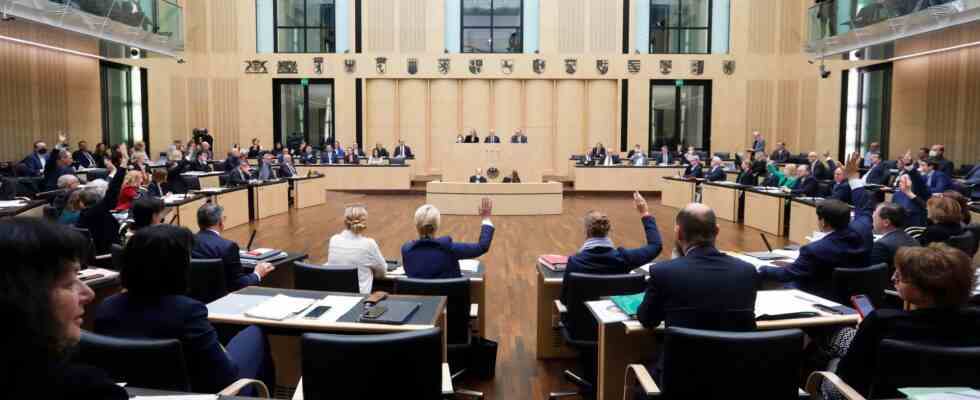Status: 03/31/2023 3:44 p.m
In its last session before Easter, the Federal Council gave the green light for several laws. In addition to financing the “Germany ticket”, the Chamber of States also approved guidelines for disposable plastic and the digitization of vehicle registration.
Plastic levy for manufacturers
In the future, plastic producers will have to pay a special levy for products such as beverage cups, plastic bags or even tobacco filters and balloons. The Bundesrat approved a corresponding law that had already been passed by the Bundestag. According to this, the manufacturers of certain products made of single-use plastic must pay into a state fund in order to relieve cities and communities financially when cleaning streets and parks.
Annually, 400 million euros should come together, which flow into the coffers of the municipalities. The background is an EU directive against pollution from single-use plastic from 2019, which is now being implemented into German law.
Digitization of vehicle registration
From September onwards, the often time-consuming visit to the authorities nationwide to register a car can now be omitted. The Bundesrat has approved an ordinance by the Federal Government on the digitization of vehicle registration. In the future, vehicle owners will be able to apply for everything they need online. The number plate stamps will then be mailed to you within ten days. In the meantime, the digital notification is sufficient as proof of admission.
Car dealerships and commercial registration services can also use the digital service. However, the states asked the federal government to examine how abuse could be prevented or curbed. They pointed out that plaques could be stolen in the mail. There is also a risk that there will be more cars with unstamped license plates on the road.
49 euro ticket
The Federal Council has approved the law for the nationwide local transport ticket. The sale starts on Monday. Above all, the law regulates the financing of the ticket for the years 2023 to 2025. The transport ministers recognized the ticket across party lines as enormous progress in transport and climate policy.
Miriam Messling becomes a judge at the Federal Constitutional Court
The Federal Council has Dr. Miriam Messling was unanimously elected as the new judge of the Federal Constitutional Court. In the First Senate she succeeds Prof. Dr. Gabrielle Britz.
Messling has been Vice President of the Federal Social Court since January 2022, where she most recently presided over the 4th Senate, which is responsible for basic security for jobseekers, and the 11th Senate, which is responsible for employment promotion law.
Blood donation for homosexual men
Discrimination against homosexual men when donating blood will end. The Federal Council approved the law, which puts an end to decades of practice of largely excluding this population group from the outset as blood donors. The new regulation is intended to “avoid discrimination in the selection of donors,” says the law.
According to the new regulation, blood donors may in future be excluded “only on the basis of the respective individual sexual behavior of the person willing to donate”, but not solely because of group membership or the sex of the sexual partner. The maximum age limit for blood donors will also be abolished.
Opinion on disciplinary law reform
In the future, the federal government wants to remove extremists from its public service more quickly and is thus meeting with the general approval of the federal states. The Bundesrat made this clear in a statement on the federal government’s draft law, which is intended to change disciplinary law.
According to this, the competent authorities can in future issue all disciplinary measures by means of a decree and no longer have to file lengthy disciplinary actions before administrative courts. Those affected can then defend themselves before administrative courts.
In its statement, the chamber of states asked the federal government to examine whether the judicial regulations should also be adjusted. “The public service does not tolerate extremists in its own ranks,” said Interior Minister Nancy Faeser (SPD) in the Bundesrat.
Other items on the agenda
The Federal Council is also advising on other federal government drafts – including basic child security and remuneration for nursing students. In addition, the chamber of states deals with industrial electricity prices, working conditions in the parcel industry and a reform of the energy sector.
A proposal to reduce food waste from Rhineland-Palatinate was removed from the agenda at short notice. There was therefore no vote on the initiative.

